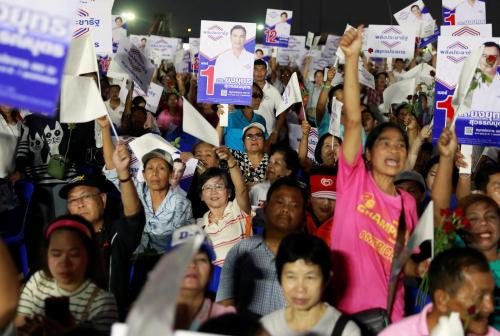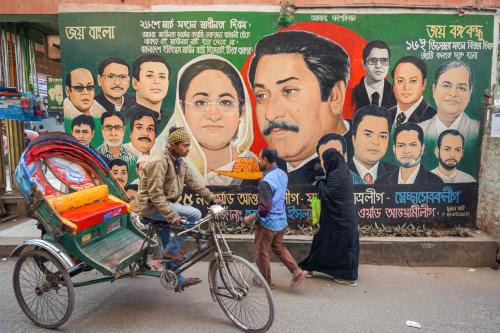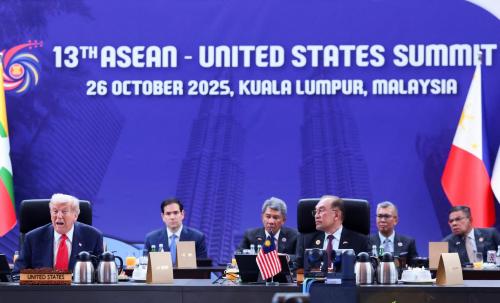Read Scott Christensen’s pre-election analysis here.
After nearly a week’s delay, Thailand’s Electoral Commission has announced what can best be called the “official preliminary” results of the March 24 national elections. While it will probably take at least until the final official results are out in early May for a new government to be formed, the outcome already points to an emergent national divide between voters who support incumbent premier General Prayuth Chan-ocha and those who oppose military rule. As the military appears more and more intent on insisting that Prayuth continue as prime minister, there is increasing risk of conflict and instability ahead. But that may not be the most probable outcome, as several scenarios are still very possible.
The first thing the election results tell us is that the narrative on Thai politics that has prevailed for nearly two decades needs to change. That narrative has presented a geographic-based class struggle—pitting poor upcountry voters loyal to the exiled and popular former Prime Minister Thaksin Shinawatra against a pro-royalist elite and middle class in Bangkok that often support military rule to defend their privileges. Sentiment toward military rule now appears to be the more relevant issue defining the political divide.
Three election surprises
This sentiment cuts across class and geographic lines, starting with the biggest surprise of the election: The pro-military Palang Pracha Rath Party (PPRP) won the largest number of votes, at 8.4 million out of 38 million ballots, against the exiled former premier’s Phuea Thai Party at 7.9 million votes. Other surprises included the emergence of the new Future Forward Party, which appealed to younger voters on a socially progressive and anti-military platform, as the third largest vote-winner. Another was the collapse of the Democrats, Thailand’s oldest party, which won just 34 percent of the votes it earned in the last election in 2011, coming in a distant fourth. Importantly, they were the last party during the campaign to state whether they would support Prayuth as prime minister again. Their statement that they would oppose Prayuth came literally at the 11th hour, and it may have driven many of their more conservative supporters to vote for Prayuth’s PPRP.
The poll results by region reflect this redrawing of the political landscape even more. Though Phuea Thai swept Thailand’s poorer northeast region, its national vote tally fell by nearly half from the last election in 2011. Phuea Thai split constituencies in its north region stronghold almost equally with the military’s PPRP (with 29 districts won versus the PPRP’s 25), while PPRP was beaten in Bangkok by the combined votes of Phuea Thai and Future Forward, which very vocally opposed the military but was not aligned with either Thaksin or Phuea Thai.
The politicians have at least until the opening of parliament in early May to reach a conclusion on forming a government. This opens up possibilities for manipulation of the final vote outcome via allegations of ballot irregularities and candidate misconduct, leading many observers to believe that military interests are working behind the scenes to structure an outcome in their favor. One high-profile case already has been raised against the leader of the Future Forward Party regarding a family asset transfer that could potentially disqualify him from politics for 20 years. Critics see these and other cases as outright manipulation by the military to hang on to power and keep Prayuth in office.
Allegations of voting irregularities are actually common to all elections in Thailand. Those pointing to instances of “extreme vote buying” and calling out the number of invalid ballots can question past election outcomes too. “Vote buying” is part of the local patronage politics that prevails throughout the country, and the disqualified ballots are fully consistent with past elections—they amounted to 5.6 percent of total ballots cast on March 24, versus 5.8 percent of the district member of parliament (MP) votes in the 2011 election and 6.0 percent in 2005. The thing that is different now, of course, is that the military can impose unprecedented influence over what cases of misconduct get prosecuted, and then influence the outcomes.
Possible post-election scenarios
This all appears to be heading toward three potential scenarios:
1A minority government: The first is that either PPRP or Phuea Thai proposes a coalition of parties that represents a minority government. Despite the rhetoric coming from each side, neither group appears to have enough seats to constitute a majority of the 500 MPs in the lower House of parliament. Each could end up running a minority government against a strong opposition. They would probably get little done and have a short life span. The two swing parties that could determine the outcome here are the Democrats and the fifth-largest party, Bhumjai Thai, neither of which has fully committed where they stand. However it’s likely that only a coalition led by PPRP would win enough votes for prime minister in the combined upper and lower Houses, given that under the new Constitution the junta will appoint the Senate and can probably count on its 250 votes to support Prayuth as premier. The military could also use the vote irregularities process to disqualify new MPs, call for new run-off elections, or even cajole or bully winning MPs from other parties into defecting and joining the PPRP.
2Government of civilian national unity: The second scenario is that all the civilian parties (excluding PPRP) form a coalition together, which would give them a vast lower House majority as well as exceed the 375-seat threshold to ratify a prime minister out of the 750 seats of the combined lower House and the Senate. But disagreements are pending over who among that large crowd would be the most suitable candidate for premier and how the ministerial portfolios should be carved up. Moreover, the continuing affiliation of Phuea Thai with former Prime Minister Thaksin remains a sticking point in particular for the Democrats, whose voting base continues to oppose the former premier. That makes this scenario less likely than the first.
3The worst-case outcome: The third scenario is a potential reaction to the second—the junta refuses to step down, on the argument that PPRP won the largest number of votes and therefore should not have to concede to a coalition government led by a different party. This scenario would see tensions rise and carries the most risk of reigniting civilian opposition or even renewed protests by members of the general public.
It’s more than likely that none of these scenarios will come to a head before the royal coronation in early May. During the interim, it remains unclear if Thailand will choose to move forward or remain tangled up in conflict over who has the right to rule. There is, however, one thing we can conclude for now: This is no longer a class struggle between rich and poor, or between disenfranchised upcountry voters and Bangkok-based elites. Divisions have now been realigned. Each side of the political divide represents more broad cross-sections of society than at most points during the last 20 years. That’s probably the one positive thing we can take away from these elections at this preliminary moment.
The Brookings Institution is committed to quality, independence, and impact.
We are supported by a diverse array of funders. In line with our values and policies, each Brookings publication represents the sole views of its author(s).






Commentary
Thailand’s election has redrawn the political landscape
April 4, 2019